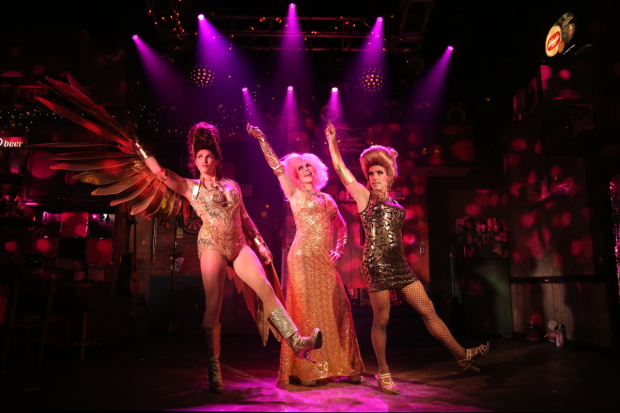The Legend of Georgia McBride
MCC Theater stages the New York premiere of Matthew Lopez’s frothy tale of a straight drag performer.

(© Joan Marcus)
"We're all born naked and the rest is drag," goes the refrain often repeated by drag superstar RuPaul. There's an undeniable truth to this statement, especially for the theatrically inclined. If all the world's a stage, don't we mere players deserve some decent costumes? This notion of everyday theater through fashion and deportment is one of the reasons drag is so accessible to the mainstream (arguably more so than any other aspect of gay culture). It also undergirds what is delightful and ultimately unchallenging about playwright Matthew Lopez's The Legend of Georgia McBride, now making its New York debut with MCC Theater at the Lucille Lortel Theatre. You'll laugh at the zingy one-liners and tap your toes to the fun song-and-dance numbers, but you won't leave the theater with a radically altered perspective on the world.
This is perhaps because Lopez (The Whipping Man) treads relatively well-worn territory. Hollywood films like To Wong Foo, Thanks for Everything! Julie Newmar and The Birdcage (or going back even further, Tootsie) long ago signified America's embrace of drag. With its uplifting theme of empowerment through donning women's clothing (and its bizarre reference to the 1992 film The Crying Game), Georgia McBride feels like something that was written two decades ago. If it had been a film in the '90s, Robin Williams would have starred in it. It's a worthwhile but not particularly novel play.
It tells the story of Casey (Dave Thomas Brown), a down-on-his-luck Elvis impersonator living with his wife, Jo (Afton Williamson), on the Florida panhandle. While his rhinestone jumpsuit suggests late-career Elvis, his boyish good looks offer Jailhouse Rock realness at best. The crowds know it, steering clear of Cleo's, the sleepy bar where he performs. When bar owner Eddie (Wayne Duvall) hires drag performers Tracy (Matt McGrath) and Rexy (Keith Nobbs) to draw in the crowds, Casey thinks his career is over, a troubling prospect considering he's late with rent and has a baby on the way. But the ever-queenly Tracy takes pity on the poor straight boy with a gift for bedazzling synthetic fabric and throws him into the show…as sexy country chanteuse Georgia McBride. Suddenly, Casey is rolling in dough as the panhandle's biggest drag sensation. What will his wife say?
Leaving aside the major suspension of disbelief required to accept drag as some sort of cash cow, Lopez traffics in a level of contrivance usually reserved for TV sitcoms like Bosom Buddies. But that doesn't really matter: The thin plot serves mostly as a platform for the playwright's prodigious wit. "Lip-synch or swim, baby," Tracy lectures Casey on the trial-by-fire nature of drag. Her drag-name suggestions ("Shalita Buffet", "Frieda Slaves") are particularly memorable.
McGrath's Tracy conveys Lopez's comedy with a winning cocktail of warmth and shade. Every line and movement is modulated for maximum hilarity. McGrath steals the show as this Obi-Wan Kenobi in heels. Brown proves an adept leading man as Casey, equal parts clueless and optimistic: He's an ideal vessel for the American dream. Williamson strikes a far more serious tone as Jo, grounding the story in real stakes. When Casey asks what her biggest fear is, she answers bluntly, "That our baby will starve." Brown and Williamson have magnificent chemistry in these moments.
The talented five-person cast sells the setup of Georgia McBride with real heart, which is a godsend in light of Mike Donahue's less-than-inspired direction. Donyale Werle's busy set tries to incorporate elements of all the locations the script requires, but mostly succeeds in confusing them. Shimmery curtains drop down for a performance montage and then are pulled away, never to be used again, not even in the finale. Stagehands scurry around during scene transitions. When Georgia needs extra help with hair and makeup, two or three black-clad stylists rush out to surround her, completely unacknowledged by the actors. A more vigorous staging would have found a way to incorporate them into the storytelling (perhaps as the drag fairies).
Ben Stanton's lighting is more successful, doing much of the heavy lifting when it comes to differentiating scenes while also creating some very impressive concert effects during the performances. Naturally, any show about drag needs killer costumes and Anita Yavich delivers them, dripping in sequins and gold lamé. Sound designer Jill BC DuBoff has created some really entertaining and revealing passages with her lip-synch tracks: fist-pumping Gretchen Wilson for Georgia, a Broadway medley for Tracy. Drag lip-synch is never as impressive on an off-Broadway stage as it is in a gay bar after you've had a few drinks, but Paul McGill (associate choreographer on Broadway's Hedwig and the Angry Inch) valiantly fills in the gap with his high-energy choreography.
Watching The Legend of Georgia McBride feels like cuddling up in a snuggie made of tulle and dreams. It's comforting and familiar in its nonthreatening fabulousness, perfect for a night out during which you would prefer to know exactly what you're going to get.











